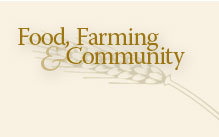
Food, Farming and Community resources is an activity of the Michigan State University Museum that provides materials to build greater understanding about local food, and the importance of sustainable practices. These issues and relationships affect everyone, everyday. Our health and the environment are at stake. From the beginning, this project was imagined as a way to increase awareness and stimulate discussion about the economic and ecological sustainability issues contemporary agriculture faces . . . issues that affect children, families, farmers, our communities, and the land around us.
These resources were developed for organizations to use in their own work: planning, training, building public awareness, and inspiring change around farmers, farming and local food.
Included here for your use are:
- A readers' theatre script, What Will Be in the Fields Tomorrow? for group reading, a shared experience, and to inspire public exploration of agriculture and local food
- A six-part community-oriented curriculum, Food, Farming and Community: A Curriculum for Adult Learners
- Essays on how-to use readers theatre to your community
- An introduction to civic dialogue as a way to engage community around these issues
- Annotated book and film lists around sustainable agriculture as a starting point for discussion
- Promotional and marketing materials and examples for your use
. . . more about the parts. . .
Readers' Theatre: What Will Be in the Fields Tomorrow? is a readers-theatre activity for informal, group reading that can bring people together in a common experience. Fields is entertainment; Fields is education, and at its best, Fields provides a starting point for continuing the conversation through facilitated dialogue and programs on important issues. Essays on how-to do readers' theatre in your community and using civic dialogue to continue the conversation are included.
Curriculum: Food, Farming and Community: A curriculum for adult learners is six companion sessions designed for adults with an interest in food systems and sustainable agriculture. It does not require any previous knowledge, only a desire to learn. Lessons link our everyday personal decisions and culture to broader concepts such as the local economy, global policies, personal health, and the future of the environment. A facilitator guide, learner packet, and PowerPoint slides are provided for each session.
Case Studies: Others experiences using these materials are shared here. The first six are about developing the script and seeking feedback on the authenticity of the content and the potential for public education. These stories provide an idea of the effect community theatre has participants and the community. Please share your experiences with the readers' theatre or the curriculum. We will add them so others may learn from you.
Research: Information on Cynthia Vagnetti's oral history work with American farmers and ranchers - the foundation for the readers' theatre piece - is in the Research section.
How we developed What Will Be in the Fields Tomorrow? is reported along with audience survey results from six pilot audiences of sustainable and organic farmer networks and a community theatre audience that included farmers and agriculture educators.
Resources: Here are links to annotated book and film lists as a basis for continuing programming through book club or film festival format and an essay on using civic dialogue to continue the conversation.
Project Team: Meet the team of individuals and organizations that have contributed to the Food, Farming and Community resources.



